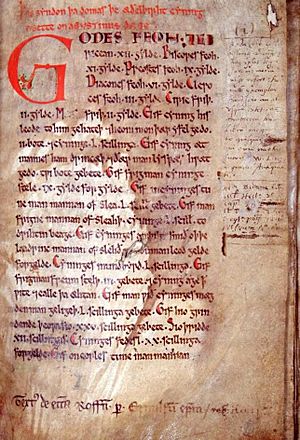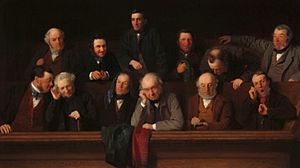English law facts for kids
English law, also known as common law, is the legal system used in England and Wales. It is usually split into two main types: criminal law (for crimes) and civil law (for disputes between people). This system has spread to many countries that were once part of the British Empire, like Australia, Canada, the United States, and New Zealand.
English law is special because it relies on something called legal precedent. This means that judges look at past decisions made by higher courts to help them decide new cases. They must follow these older decisions. English law does not have a single written constitution or a complete book of all its laws. However, there are unofficial books that list the current laws in an organized way.
The Parliament (the main law-making body) has the power to create new laws. Once Parliament makes a law, it is automatically considered valid. Courts cannot challenge these laws. Only Parliament itself can change a law it has made.
Contents
History of English Law
The oldest known example of English law is the Law of Æthelberht, written around the year 602. This was part of Anglo-Saxon law, which was based on older Germanic laws. In those times, families or "kinship groups" were responsible for their members' actions and for protecting them. If someone wronged another, they would pay a "Weregild." This was a set value placed on every person and piece of property.
By the 10th century, this system changed. People organized themselves into groups called "hundreds." These groups were no longer based on family ties. Instead, they worked together to protect each other and make sure laws were followed. A "hundredsmann" was in charge of each hundred and helped settle disagreements.
Norman Conquest and Common Law
In 1066, the Norman conquest of England brought many changes to the law. While many Anglo-Saxon laws stayed, the Normans slowly added new ones. Before the Normans, most laws were local, handled by local courts. The Normans introduced royal courts. Over time, these royal courts started using the best local laws across the whole country. This created what we now call English common law. It was a system of laws that was common to everyone in England.
Around this time, another court system developed called "equity." It was managed by the Court of Chancery. Equity helped when common law didn't have a clear answer. For example, equity decisions could involve putting a lien (a legal claim) on property, fixing a property line, or ordering someone to do something to prevent harm.
Blackstone's Commentaries
In the 18th century, a legal scholar named William Blackstone wrote a very important four-book series. It was called Commentaries on the Laws of England. This was the first time someone had put together a complete overview of English law. It was first published between 1765 and 1769 and was reprinted many times. For a long time, Blackstone's Commentaries were the main way people learned about law in both England and America. Even Abraham Lincoln studied these books to teach himself law.
The Jury System
The jury system likely came to England shortly after the Norman conquest. At first, jurors were like witnesses who knew about the case. But over time, especially by the reign of Henry II of England, they became the "trier of fact." This means they were the ones who decided what actually happened in a court case.
Juries began to discuss the evidence given by the people involved in a dispute. As time went on, jurors learned less about a case before the trial. They would hear all the information in court and then make their decision based on that.
English Law in Wales
Unlike Scotland and Northern Ireland, Wales is not a separate legal area within the United Kingdom. The old laws of Wales were removed by King Henry VIII's Laws in Wales Acts. This made Wales follow the same laws as England. For many years, if a law mentioned England, it also included Wales. This changed with the Welsh Language Act 1967. Now, the legal area is often called "England and Wales."
Even though Wales has some political independence, its legal system still uses English common law. This is different from Northern Ireland, which kept its own legal system. A big difference in Wales is the use of the Welsh language. Laws about the Welsh language apply only in Wales, not in the rest of the UK. The Welsh Language Act 1993 made the Welsh language equal to the English language in public services in Wales. Welsh can also be spoken in Welsh courts.
Sources of English Law
In England, laws come from different places, in a specific order of importance:
- European Union law (though this is changing due to Brexit)
- Laws made by Parliament (called legislation)
- Rules from common law and equity, which come from past court decisions (precedents)
- Rules about how Parliament works
- General customs
- Important legal books written by experts
Related pages
- Adversarial system
- Canon law
- Civil law
- Common law
- Constitutional law
- Inquisitorial system
- International law
- Maritime law
- Roman law
- Salic law
- Scots law
- Welsh law
Images for kids
-
The Royal Courts of Justice in London is where the main courts for England and Wales are located.
-
Sir William Blackstone in 1774, after he became a judge.
-
A map of the British Empire during the time of Queen Victoria. "Dominions" meant all the lands belonging to the Crown.
-
The former Middlesex Guildhall is now the home of the Supreme Court of the United Kingdom.
See also
 In Spanish: Derecho de Inglaterra para niños
In Spanish: Derecho de Inglaterra para niños
 | Madam C. J. Walker |
 | Janet Emerson Bashen |
 | Annie Turnbo Malone |
 | Maggie L. Walker |







